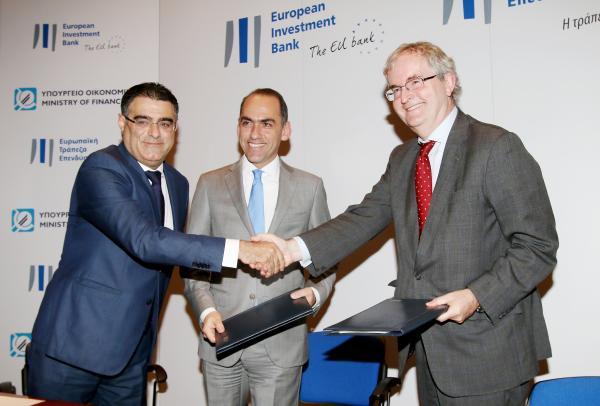
The European Investment Bank (EIB) signed today a EUR 40 million finance contract to improve drinking water supplies to the greater Nicosia region, along with an additional EUR 15 million of financing for anti-flooding infrastructure investments in Larnaca, reaffirming the EU bank’s commitment to Cyprus.
The two agreements were signed in Nicosia today in a public ceremony in the presence of Cyprus’s Minister of Finance Harris Georgiades, the EIB Vice-President who is responsible for operations in Cyprus, Jonathan Taylor, and Cyprus’s Agriculture, Rural Development and Environment Minister Nicos Kouyialis.
“The European Investment Bank is strongly engaged in Cyprus and I can assure you that we are determined to continue to be so in the future. The EU bank remains firmly committed to supporting the Cypriot economy and we have clearly shown this by our actions during the crisis and again today with financing for two key infrastructure projects,” said EIB Vice President Jonathan Taylor.
The EIB signed a EUR 40 million finance contract with the Cyprus Ministry of Finance for a water pipeline, bringing water from the Vasilikos desalination plant to the greater Nicosia region.
The project will help to improve the security of supply, and quality of, drinking water for the greater Nicosia region, while also representing an important component of climate change adaptation. The western Mesaoria region suffers from extended droughts and overexploitation of groundwater sources, so this project can help limit further reduction of these resources, while at the same time increasing the reliability of the drinking water supply system. The project will also contribute to the compliance of the Republic of Cyprus with EU legislation, particularly the Drinking Water Directive and Water Framework Directive.
The second loan, for an amount of EUR 15 million, is going to the Larnaca Sewerage Board (LSB) for the construction of two anti-flooding rain water pumping stations in Larnaca. In recent years the city has suffered from frequent flooding, damaging crucial infrastructure and threatening people’s homes and businesses. The construction of the anti-flooding scheme aims to prevent similar events from happening again and thereby puts the city of Larnaca on a more climate-resilient path for its future. Building resilience to climate change impacts is one of the key pillars of the EIB’s climate strategy, which EIB shareholders adopted last year just before the Paris climate conference.
The EIB and LSB have an existing EUR 75 million operation to cover LSB’s Phase B II network expansion and wastewater treatment plant capacity increase. This loan will now rise to EUR 90 million, in order to cover the cost of the two pump stations.
“The EU bank’s continued engagement in Cyprus is really a sign of confidence in the country’s economy and at the same time shows that there are excellent and viable investment projects coming out of Cyprus. We remain active and committed to supporting economic growth and the creation of new jobs,” EIB Vice President Taylor added.
In the last five years, the EIB has invested some EUR 1.3 billion in new, priority investments in Cyprus, including public sector projects in areas such as transport, energy, education, waste treatment and water supply. The EIB has also provided considerable support to the private sector through its cooperation with ten local banks to provide long-term and affordable financing to SMEs and MidCaps, which are the backbone of Cyprus’s economy, representing over 95% of local companies and 80% of employment. In 2015, the EIB maintained its high level of activity, providing a total of EUR 215 million to the Cypriot economy, representing 1.5% of annual GDP, the highest percentage of all EIB shareholders.

Photographer: EIB ©To be defined
Download original

Photographer: EIB ©To be defined
Download original

Photographer: EIB ©To be defined
Download original

Photographer: EIB ©To be defined
Download original